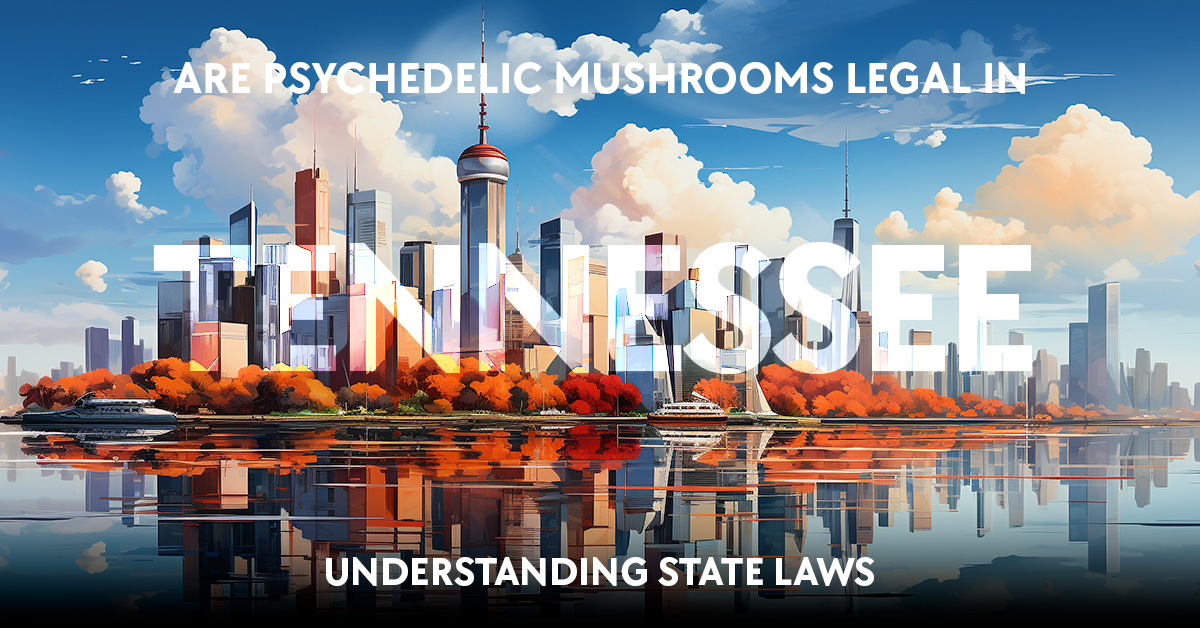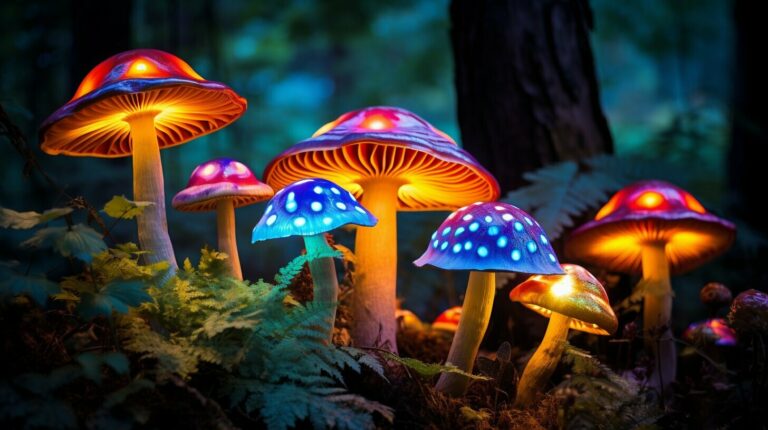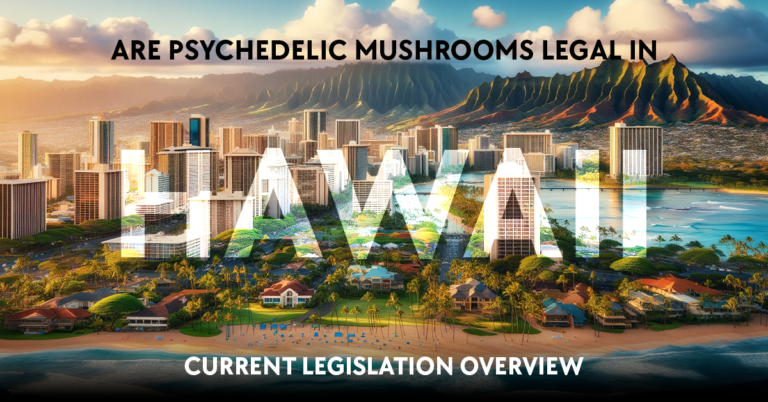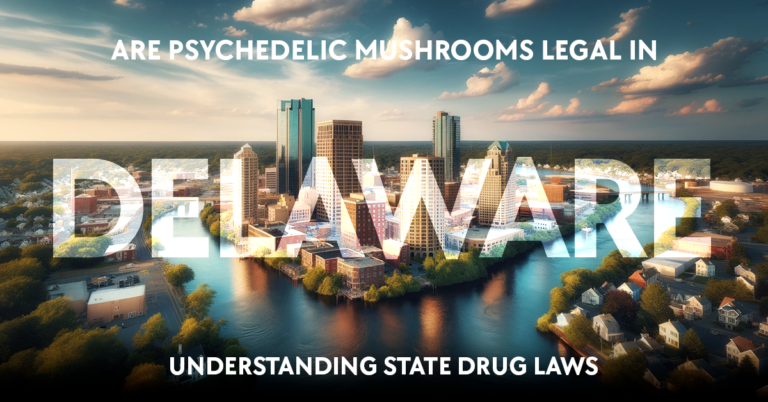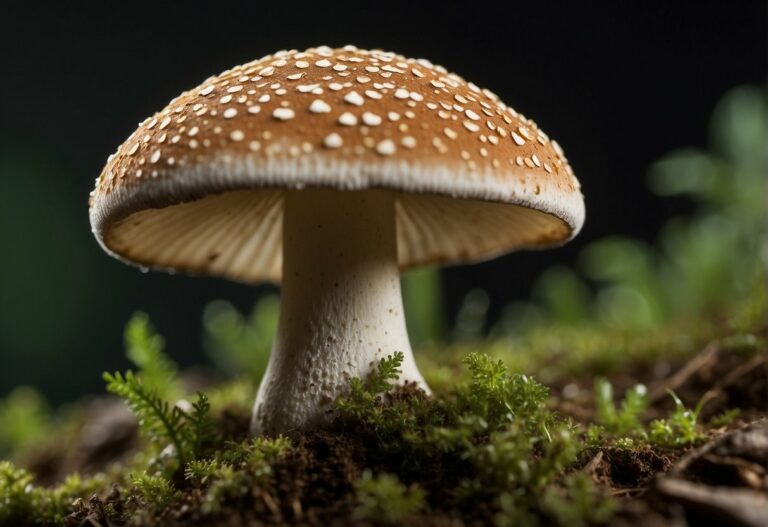If you’re looking to understand the legal status of psychedelic mushrooms, often referred to as magic mushrooms or shrooms, in Tennessee, it’s essential to be informed about the current laws. Psilocybin, the active hallucinogenic compound found in these fungi, is classified as a Schedule I controlled substance under both federal and Tennessee state law. This classification indicates that psilocybin mushrooms are deemed to have a high potential for abuse, no currently accepted medical treatment use in the U.S., and a lack of accepted safety for their use under medical supervision.

The possession, sale, or distribution of magic mushrooms is illegal in Tennessee, and such actions can lead to severe legal consequences. Despite ongoing research into potential therapeutic benefits of psilocybin for mental health conditions, any use outside of regulated scientific studies remains prohibited. It’s critical for you to understand that neither medical nor recreational use of shrooms is legal in Tennessee, and state authorities continue to enforce these laws strictly.
Legality of Psychedelic Mushrooms in Tennessee
Table of Contents
https://www.youtube.com/watch?v=6xwby0ULxBM&embed=true
In Tennessee, psychedelic mushrooms, also known as psilocybin mushrooms, are considered a Schedule I drug under both state and federal laws. This categorization means they are regarded as substances with a high potential for abuse, no recognized medical use, and a lack of accepted safety for use under medical supervision.
If you are found in possession of psychedelic mushrooms in Tennessee, you could face criminal charges. Tennessee law does not differentiate between the possession of mushrooms for personal use and the intent to distribute; possession in any amount may result in punishment.
The table below outlines the potential penalties for the possession of psychedelic mushrooms:
| Amount Possessed | Criminal Charge | Potential Penalty |
|---|---|---|
| Any amount | Simple possession or casual exchange | Misdemeanor, up to 1 year in jail, and/or fines |
| Larger quantities or evidence of distribution | Sale or possession with intent to distribute | Felony, penalties increase with amount and can lead to several years in prison |
Please note that the legal status of psychedelic mushrooms can be subject to change, as drug policy reforms are continuously under debate. However, as of now, the sale, transport, and cultivation of psychedelic mushrooms remain illegal under Tennessee’s controlled substances laws. It is important for you to stay informed of the local laws to avoid any legal repercussions related to psychedelic mushrooms.
Federal Classification and State Regulations

At the federal level, psilocybin—the primary psychoactive component in psychedelic mushrooms—remains classified as a Schedule I controlled substance. This classification indicates that psilocybin is considered to have a high potential for abuse, no currently accepted medical use in treatment in the United States, and a lack of accepted safety for use under medical supervision.
Despite the federal stance, several municipalities have begun efforts to decriminalize or deprioritize enforcement against the possession and use of psychedelics. It’s important to note that decriminalization is not the same as legalization. Decriminalization means that while psychedelics remain illegal, penalties for possession and personal use would not be as severe.
In Tennessee, as with most states, psychedelics including psilocybin remain illegal. The production, distribution, sale, and possession of psychedelic substances like psilocybin can result in significant legal penalties.
-
Psychoactive substances: Psychedelics are substances that produce changes in perception, mood, and cognitive processes.
-
Medicinal potential: Despite federal prohibition, recent research explores psilocybin’s potential benefits in treating various mental health conditions.
-
Municipal decriminalization: Some cities have passed resolutions to reduce the priority given to enforcing laws against the use and possession of psychedelic substances.
-
State regulations: Specific state laws can enhance or even provide stricter regulations than federal laws.
Always be conscious of the differences between federal law and your local state regulations. Changes continue to occur, with debates on the topic prompting a re-examination of laws surrounding psychoactive substances. It’s essential to stay informed and abide by current legislation.
Psychedelic Mushrooms Medical Research

You are entering a realm of medical research that is exploring the potential of psychedelic mushrooms, particularly psilocybin, for treating various mental health disorders. This section will inform you about the current legal status and applications in therapy, the research that’s underway, and the nuanced differences between psychedelic substances.
Medical Use of Psilocybin
Research: Ongoing studies have brought psilocybin, a naturally occurring compound in certain species of mushrooms, to the forefront of medical interest. In psychotherapy, psilocybin is being evaluated for its therapeutic benefit in treating conditions like depression, particularly where patients show resistance to conventional treatments.
Potential Benefits in Mental Health Disorders
Mental Health: Psilocybin shows promise in the treatment of a spectrum of mental health conditions, including depression, anxiety, PTSD, and even addiction. Smaller-scale studies have reported significant improvements, invoking interest in larger, more definitive trials.
States with Psychedelic Research Initiatives
- Colorado
- Oregon
- California
- Massachusetts
- Michigan
- Connecticut
- Georgia
- Idaho
- Illinois
- Maine
- Missouri
- New Hampshire
Note: These states have ventured into psychedelic research initiatives to various extents, with some like Oregon decriminalizing psilocybin for therapeutic use.
Psychedelic Therapy Settings
Setting: In approved therapy sessions, licensed clinicians administer psilocybin in a controlled environment. As part of psychotherapy, the focus is ensuring safety and supporting you through the experience to maximize therapeutic benefit.
Roles of Microdosing
- Creativity: Some research suggests that microdosing psilocybin may enhance creativity and relieve symptoms related to mental health.
- Psychotherapy: Microdosing, which involves taking sub-hallucinogenic doses, is becoming a subject of study in psychotherapy to ascertain its efficacy and potential.
Comparison of Psychedelic Substances
- Psilocybin
- LSD
- MDMA
- Ketamine
- DMT
- Ayahuasca
- Ibogaine
- Mescaline
Each of these substances has unique psychoactive properties and potential for therapeutic benefit. While psilocybin is noted for its potential in treating depression and anxiety, others like MDMA are being researched for PTSD, and Ketamine for treatment-resistant depression.
Implications of Psychedelics Use

Psychedelic mushrooms, particularly those containing psilocybin, present a complex landscape of recreational use, potential therapeutic benefits, and legality. As you explore the implications of these psychoactive substances, it’s important to recognize the nuances in both recreational and therapeutic contexts.
Recreational Use and Public Perception
Recreational use of psychedelics like psilocybin mushrooms is illegal in most of the United States, including Tennessee. Public perception of these substances is shifting, though, often influenced by reports of their use in religious or spiritual contexts as well as a growing body of research suggesting potential benefits. Despite this, possession and sale in Tennessee can lead to severe penalties, which include fines and imprisonment. It’s also noteworthy that while the sale of psilocybin mushrooms is prohibited, the sale of spores is sometimes allowed for educational and research purposes, as spores do not contain psilocybin themselves.
- Legal status in Tennessee: Psilocybin mushrooms are classified as a Schedule I substance.
- Penalties: Possession can range from misdemeanor to felony charges.
- Public perception: Increasing interest in potential positive uses alongside risks.
Therapeutic and Non-Therapeutic Use
In therapeutic settings, ongoing studies are investigating how psilocybin could be applied in psychotherapy to treat conditions like depression, PTSD, and anxiety. Your understanding of psilocybin’s medicinal potential should be informed by this research, which indicates it may facilitate profound experiences that can lead to significant and lasting changes when used in a controlled, clinical setting. The idea of psilocybin as a tool in treating various disorders has contributed to the conversation on legalization and regulated medical use, helping to differentiate it from its recreational use.
- Therapeutic benefits: Research suggests benefits for mental health conditions.
- Medical use: Psilocybin is being studied under controlled clinical trials.
- Addiction: There’s potential for use in treating substance use disorders.
Remember that while there’s growing advocacy for therapeutic use and potential decriminalization, psilocybin mushrooms currently remain illegal for both recreational and medicinal use in Tennessee.
Local Decriminalization and Legalization Efforts
When you explore the topic of psychedelic mushrooms, it’s important to understand the nuances of decriminalization and legalization. While Tennessee state law prohibits the possession and use of psilocybin mushrooms, certain localities across the United States have taken steps toward reforming these regulations.
Denver became the first city to decriminalize the possession of psilocybin mushrooms in May 2019. Since then, several other municipalities have followed suit, often through ballot initiatives or city council votes. For example:
- Oakland and Santa Cruz in California.
- Ann Arbor in Michigan.
- Northampton and Somerville in Massachusetts.
- Cambridge in Massachusetts, not only decriminalized psychedelic plants and fungi but also deprioritized law enforcement actions against their use.
Furthermore, Washington, D.C., also known as the District of Columbia, passed Initiative 81 in November 2020, which similarly declared the non-commercial cultivation, distribution, possession, and use of entheogenic plants and fungi among the lowest law enforcement priorities.
While these moves don’t equate to full legalization, they reflect a growing trend where local jurisdictions are rethinking their approach to psychedelic substances. Decriminalization is an interim step that reduces penalties associated primarily with possession. Complete legalization, conversely, involves establishing a regulated system for distribution and use, which no municipality in the United States has yet implement for psychedelic mushrooms.
Your understanding of the legality of psychedelic mushrooms should consider these local movements, which may signal broader changes in the future. Keep in mind, however, that despite these local policies, under federal law, psychedelic mushrooms remain illegal and classified as a Schedule I substance.
Legal Ramifications of Possession and Sale
In Tennessee, psychedelic mushrooms are classified under Schedule I drugs, which include substances that have a high potential for abuse and no accepted medical use. If you are found in possession of these mushrooms, you may face significant legal penalties.
-
Possession: Being caught with any quantity of psychedelic mushrooms can result in criminal charges. The consequences depend on the amount in your possession. This can range from a misdemeanor to a felony, leading to fines and imprisonment.
-
Sale: Selling psychedelic mushrooms is a more severe offense and is prosecuted vigorously. A conviction for the sale of mushrooms can lead to lengthy prison sentences and steeper fines.
It is important to note that even the spores of psychedelic mushrooms, which do not contain the psychoactive substances, are subject to legal scrutiny. While in some states mushroom spores are legal due to their lack of narcotics, the sale or possession of spores with the intent to cultivate mushrooms can lead to charges of attempted manufacture of a controlled substance.
-
Cultivation: Cultivating or producing psychedelic mushrooms is illegal and treated similarly to possession and sale. Penalties are severe because it can be considered manufacturing a Schedule I drug.
-
Species: There is no differentiation in penalties between different species of psychedelic mushrooms; all are forbidden.
The criminalization of psychedelic mushrooms emphasizes the risks associated with their unauthorized sale, possession, or use. The misuse of these substances is a public health concern and is taken seriously by Tennessee law enforcement. Laws are in place not just to prevent their prohibition but also to control the potential for harm. Always ensure you stay informed of the laws in your state to avoid the legal ramifications of these substances.
Cultivation and Spores
When discussing the legal landscape of psychoactive mushrooms in Tennessee, it’s crucial to differentiate between mushroom cultivation and possession of spores. Cultivation of psilocybin mushrooms, which includes any activities involved in growing and harvesting these hallucinogenic species, is deemed illegal under state law. Engaging in such activities can lead to significant fines and legal repercussions.
Mushroom spores, however, occupy a grey area in terms of legality. While the spores of psilocybin mushrooms themselves do not contain psilocybin, the possession of them with the intent to cultivate can be deemed illegal. It’s essential to understand that the absence of psilocybin in the spores does not necessarily protect you from prosecution if there’s evidence of intent to produce psychoactive mushrooms.
| Status | Entity | Details |
|---|---|---|
| Illegal | Cultivation of Psilocybe | Growing and harvesting psilocybin mushrooms is prohibited. |
| Ambiguous | Possession of Mushroom Spores | Spores are legal unless intended for illegal mushroom growth. |
In contrast, species like Amanita muscaria are not regulated under the same statutes due to different active compounds. However, this does not imply they are safe or legal for recreational use. It’s advisable to stay informed about local regulations to navigate the complex legality surrounding these substances.
Your awareness of these nuances is imperative, especially given the evolving legal discussions surrounding psychoactive substances. Remember, while the information provided is current, laws can change, and it’s your responsibility to remain compliant with local statutes.
Impact on Mental Health and Society
In Tennessee, the conversation surrounding psychedelics like psilocybin mushrooms touches on their potential therapeutic benefits as well as their influence on society and culture. These topics often intersect, with therapy and societal perspectives shaping public opinion and legislation.
Mental Health and Psychedelics
Psychedelics, a group of psychoactive substances, have shown promise in treating various mental health conditions. Clinical research suggests that substances like psilocybin can offer significant benefits in the treatment of depression, addiction, anxiety, PTSD, and treatment-resistant depression when combined with psychotherapy. A study focusing on psilocybin reported safety and efficacy in a small group of patients with obsessive-compulsive disorder, indicating a positive trajectory for mental health applications.
Social and Cultural Perspective
The public perception of psychedelics is a pivotal factor in their legal status and use in society. Cultural history reveals that psychedelic substances, including psilocybin mushrooms, were once integral to religious and spiritual ceremonies. Today, shifting attitudes may reflect a growing recognition of their potential therapeutic value. However, legality often lags behind shifting cultural perceptions, and the illegal status of psychedelics like psilocybin continues to influence public opinion, albeit complexly. The promise of psychedelics fostering creativity and altering perception inspires debate about their place in modern culture and therapy.
International Stance on Psychedelics
When exploring the international landscape, you’ll find that the legal status of psychedelic substances like psilocybin varies considerably. In Europe, some countries have decriminalized the possession of small amounts of magic mushrooms for personal use, while others maintain strict prohibition.
- Netherlands: Known for a more liberal stance, allowing the sale of “magic truffles” which contain psilocybin.
- Portugal: Decriminalized possession of all drugs in small amounts for personal use, psychedelics included, focusing instead on therapy and treatment.
Psychedelics, for their part, are undergoing a renaissance in medical research globally. The interest in psychotherapy applications is evident, with numerous studies investigating the potential benefits of substances like psilocybin for treating mental health conditions such as depression and PTSD.
| Region | Legal Status |
|---|---|
| Europe | Mixed; varies by country |
| Americas | Evolving; some areas considering decriminalization |
Within the broader international community, there is an ongoing conversation about the potential of psychedelics in medical use. Various countries look towards a future where psychedelics could be integrated into medical frameworks, considering the emerging evidence supporting their efficacy in certain contexts.
It’s important to know that despite a gradual shift towards decriminalization and medical legalization in some areas, under international law, substances like psilocybin remain largely illegal. Treaties such as the Psychoactive Substances Convention influence global policy, placing psychedelics in restrictive schedules.
If you’re curious about legalization, decriminalization, or legal reforms regarding psychedelic substances, it is essential to consult with the most current legal status in your specific region or seek out expertise in international drug policy.
Safety, Risks, and Responsible Use
When considering the use of psychedelic mushrooms, which contain psilocybin, awareness and understanding of their safety and risks are crucial. While some studies suggest therapeutic benefits of psilocybin in psychotherapy, it is essential to underscore that currently, in Tennessee, the legal status prohibits recreational and medicinal use.
Safety:
- Psilocybin has a low potential for addiction.
- It is critical to have a controlled environment if used for therapy to mitigate risks.
Risks:
- Unregulated use increases the likelihood of psychoactive experiences that may entail emotional and psychological discomfort.
- The misuse of psychedelics can lead to distressing trips, especially without proper guidance.
Responsible Use:
- Should the legal landscape change, using these substances under medical supervision would be the safest approach.
- Educate yourself on the potential for psychotherapy benefits and understand the importance of set and setting in such therapeutic contexts.
Always consult the current laws regarding psychedelics in your area before any form of use. Current laws in Tennessee consider psilocybin as a Schedule I substance, making shrooms and their psychoactive components illegal to possess, sell, or use outside of approved research.
Remember, no substance use is entirely risk-free. Though legalization and medicinal use are hot topics, the law is absolute until changes occur. It is your responsibility to understand both the potential health implications and the legal repercussions associated with psilocybin mushrooms.
Alternative and Traditional Psychedelics
When you explore the realm of psychedelics, you’ll find a variety of substances, each with unique properties and legal statuses. Psychoactive plants and compounds have been used for centuries in traditional medicine. For instance, ayahuasca, a brew with potent psychedelic properties, is deeply embedded in the cultural practices of indigenous Amazonian tribes.
In contrast, substances like LSD (lysergic acid diethylamide) and MDMA (methylenedioxymethamphetamine) were synthesized in modern laboratories. LSD offers a powerful psychedelic experience, while MDMA is known for its empathy-enhancing effects and is currently being explored for psychotherapy.
Psilocybin, the active ingredient in “magic mushrooms,” has a considerable history in nature-based and spiritual practices. It’s being studied for its therapeutic potential in treating various mental health conditions.
| Substance | Medicinal Use | Legal Status in Tennessee |
|---|---|---|
| Ayahuasca | Traditional medicine, modern psychotherapy | Illegal |
| DMT | Part of ayahuasca, research on depression | Illegal |
| Psilocybin | Trials for depression, anxiety | Illegal |
| LSD | Investigated for various mental health uses | Illegal |
| MDMA | PTSD treatment in clinical trials | Illegal |
| Ketamine | Approved for treatment-resistant depression | Controlled substance |
| Ibogaine | Addiction treatment research | Illegal |
| Mescaline | Native American ceremonial use | Illegal, except in specific religious contexts |
The convergence of traditional and alternative methods is leading to a renaissance in the study of these substances. Plants like peyote, from which mescaline is derived, have sacred status in some Native American cultures. Meanwhile, ketamine, initially developed as an anesthetic, has been repurposed for its rapid-acting antidepressant effects.
You should be aware that the legality of these substances varies widely, with many currently classified as illegal under both federal law and in Tennessee. However, as research continues to demonstrate potential medicinal uses, legal perspectives on these substances may evolve. Your experience with these compounds can depend greatly on their legality and the context in which they are used.
Psychedelics in Modern Medicine
Recent years have seen a resurgence in the interest and research in the medicinal use of psychedelics, particularly psilocybin, the active compound in “magic mushrooms.” These substances are being studied for their potential in psychotherapy and treatment-resistant depression, among other mental health issues.
In the realm of clinical trials, significant development has occurred with psilocybin. Researchers have observed promising outcomes when administering psilocybin in controlled settings for patients battling with severe forms of depression. The compound has been granted “breakthrough therapy” designation by the FDA for treatment-resistant depression, expediting the review process for this particular indication.
Psychedelic therapy involves a holistic approach, combining your use of psychedelics with supportive psychotherapy sessions. The aim is to gain a deeper understanding of oneself and to address psychological distress. Though legalization for medical use is still limited, several locations are re-evaluating their stance due to the encouraging research findings.
Medicinal use of psychedelics promises a new frontier in medicine. However, it’s crucial to recognize that these treatments are not yet widely legal or available. In Tennessee, regulations are strict, and the use of psychedelic mushrooms for any purpose remains illegal without specific authorization or decriminalization measures in place.
Your exploration into this field should be rooted in awareness of the current legal framework, ongoing scientific inquiry, and the understanding that medical acceptance continues to evolve alongside emerging evidence.
Frequently Asked Questions
In Tennessee, the legal landscape around psilocybin, the active compound in psychedelic mushrooms, is strict and unambiguous. Here, we address common queries concerning the legal status of these substances.
What are the laws governing the possession of psilocybin mushrooms in Tennessee?
In Tennessee, psilocybin mushrooms are classified as a Schedule I controlled substance. This means that possession, sale, manufacture, or distribution of psilocybin is illegal and may result in serious legal consequences.
Are there any medical exemptions for the use of psychedelic mushrooms in Tennessee?
There are currently no medical exemptions for the use of psychedelic mushrooms in Tennessee. State law does not recognize psilocybin as a medicine, and it remains illegal under state and federal law.
Has there been any recent legislation changing the legal status of psilocybin in Tennessee?
As of now, there have been no recent legislative changes to the legal status of psilocybin in Tennessee. It remains a controlled substance with no allowances for medical or recreational use.
What consequences might an individual face if caught with psychedelic mushrooms in Tennessee?
If you are caught with psychedelic mushrooms in Tennessee, you may face severe penalties, including hefty fines and prison time. The severity of the consequences generally depends on the amount of the substance found in your possession and any prior criminal history.
Does Tennessee have any ongoing research or clinical trials involving psilocybin mushrooms?
To date, there are no public records of ongoing research or clinical trials involving psilocybin mushrooms taking place within Tennessee.
Are there any cities or counties in Tennessee where psychedelic mushrooms are decriminalized?
No cities or counties in Tennessee have decriminalized psychedelic mushrooms. They remain fully illegal across the entire state without any exceptions for decriminalization.

